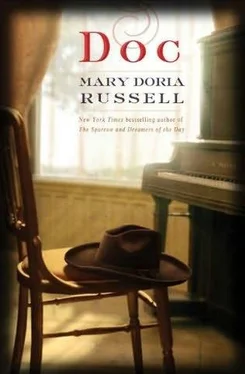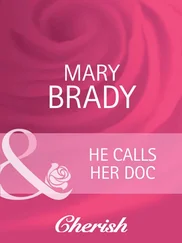Which was why, even without an advertisement in the Ford County Globe or the Dodge City Times , Doc Holliday’s business picked up quite a bit that summer. Word got around because women talk.
Eventually even Mrs. George Hoover overheard about Wyatt’s teeth, though no one told her directly. Few Dodge Citians spoke to Mrs. Hoover, not even other Methodists. Whores envied and resented her. Men who’d fucked little Maggie Carnahan—before Jesus saved her and Big George married her—didn’t hardly know how to act around her. And certainly, no Democrat would give Margaret Hoover the time of day.
She was used to her isolation and took a bit of pride in that evidence of her higher calling and strength of character. She had come a long way since drifting on the sea of sin and liquor that had once carried her so far from the Lord. She found it difficult to remember New York these days. She was such a greenhorn then! So foreign, so trusting.
And so much of her previous life seemed nightmarish to her, lived as it was in moonlight and in shadow.
“How old are you?” the Old Mister asked when she first came to work with her cousin.
“Thirteen, sir,” she said, dropping a curtsy, just as she’d been taught.
“Old enough for a lover,” he said. Then he cackled at her confusion.
He liked to watch while she dusted or polished or swept. In long, empty hallways and silent rooms, he would stand half-hidden in doorways, a small smile on his withered old lips.
He thought it was great fun to startle her, to make her jump. Wary, she learned to notice the musty old-man odor of stale, sweaty woolens, and cigarette smoke, and booze, and piss. Trying not to shudder, she would call out, “Morning to you, sir,” just to let him know she wasn’t fooled.
Sometimes he would speak in low, hushed, secret tones that she almost didn’t understand—so new she was from the old country, so unfamiliar with the speech of Americans. When she could make out the words, what he said made no sense.
“When you live with me, I will love you and punish you,” the Old Mister mumbled one quiet afternoon. “I will kidnap you, and you will give yourself up to me, and you will wear no clothing while you scrub floors, but I will feed you sweets … Here. Drink this. Go on. It’s only a little.”
Repulsed. Intrigued. Frightened. Intoxicated. Maggie hardly knew what she felt, except she wished she’d never left Belfast. She was so lonely, and the Old Mister was the only one who seemed to like her, and she liked the liquor. Sweet port, it was. Warming in the cold damp winter. So warming that it was possible to ignore an old man’s cold, bony hands.
“Any port in a storm,” Old Mister would mumble. Then he’d giggle, like he’d made a joke.
Young Missus could see what was going on between her father-in-law and the new maid, and she despised Maggie for it. “You are a wicked girl,” she whispered fiercely. “You’ll be punished for what you’re doing with him.” Young Missus could slap her and make Maggie’s life a trial, but she couldn’t fire her. Only the Old Mister could do that. He held the purse strings and ruled the house, and it was he who led young Maggie Carnahan to walk in lasciviousness, lusts, and excesses of wine—
All that was behind her now. Maggie Carnahan was dead. A clean new soul had risen in her place, rejoicing in Jesus. Mrs. George Hoover was a teetotal Methodist, the wife of a good man, and a rich woman—No! Better than a rich woman. She was a lady .
At the end of July, Margaret Hoover overheard talk about Wyatt Earp and the new dentist’s work. She began to pay attention to the deputy’s demeanor when she saw him at church on Sunday. It’s time he did more for temperance than pray, she decided, and that afternoon she urged her husband to approach Wyatt about the convention in August.
Big George was surprised that Margaret had thought of such a thing and was inclined to dismiss the notion, but his little wife could be remarkably insistent. Before long she had convinced him that this was a good opportunity to involve Wyatt in politics. In fact, George became so certain of the wisdom of the plan, he invited Nick Klaine along when he went to see Wyatt at the Iowa House. Which meant the newspaperman was right there taking notes for the Dodge City Times when the offer was made.
“Wyatt, I know you’re on duty in a few minutes, so I’ll get straight to the point,” George started out, after saying “Afternoon” to Doc Holliday and Morgan. “The Republican Party needs men like you. You’re respected, you’re honest, and you can’t be intimidated by the saloon interests. We’d like you to act as the Ford County representative to the party’s state convention next month. This could be the year that Prohibition gets onto the Kansas platform. Yours could be the vote that puts it over the top. Now, the convention lasts two weeks, but we can get you the time off, and we’ll cover your lost wages and expenses. What do you say?”
Wyatt didn’t say anything at all. George’s earnest smile remained unaltered, although the effort to maintain its confident brightness became somewhat more visible as the seconds ticked by. He glanced at Nick Klaine, whose pencil was poised in anticipation of Wyatt’s answer. “You see, Klaine?” George cried. “This is a momentous decision and this is just the sort of judicious consideration I expected from Wyatt Earp!”
In point of fact, Wyatt was considering the offer carefully, but he was also choosing his words, still avoiding the letter s in front of people. “I’ve been dealing faro at the Alhambra, Mr. Hoover.”
“We all do what we have to, to make a living, Wyatt,” George pointed out smoothly, “but that doesn’t mean we can’t work for a better and more moral nation.”
I guess, Wyatt would have said ordinarily. Instead he just shrugged, which made him seem more reluctant than he really was.
“You don’t have to give me an answer right now,” George said, “but representing us at the convention could lead to other things. Just think about the possibilities, is all I’m asking.”
George said good day to them all and left with Nick Klaine. Wyatt looked at Morg, who said, “Why not?”
Doc sighed, and put his head in his hands, and wondered how his life had come to such a pass that he was surrounded by Republicans. “You’ll need a suit,” he warned Wyatt. “You can’t go to Topeka dressed like that.”
The idea of buying new clothes was enough to make Wyatt say, “Oh, hell, then,” and brush the whole idea off.
* * *
For the next couple of days, he went about his business, working on his words whenever he was alone, until the sounds came natural. Wasn’t long before he was confident enough to call, “See you on Sunday,” right out loud to the preacher. And he produced a sarcastic but clearly enunciated “Very funny” when Morgan played like he was going to punch him in the mouth at supper one morning.
Wyatt had done some hunting while he was out saying “Mississippi,” and Mattie cooked up a pretty good venison stew. She’d invited his brothers over for a meal, but Wyatt regretted it because all Morg and James would talk about was his new teeth.
“You still ain’t seen Eddie Foy’s act?” Morgan cried around a mouthful of deer meat. “Well, hell, you should go! What are you waiting for?”
“I don’t know, Wyatt,” James said, all serious. “You smile? Somebody might die of apoplexy or something. Might cause a riot, even. You don’t want to be responsible.”
“James is right, Wyatt. Start slow,” Morg urged. “Just hang around outside and listen for a while. Course, you’ll want to alert the docs—”
“Yeah,” James agreed, “you might need McCarty and Holliday, both, if your face cracks.”
Читать дальше












